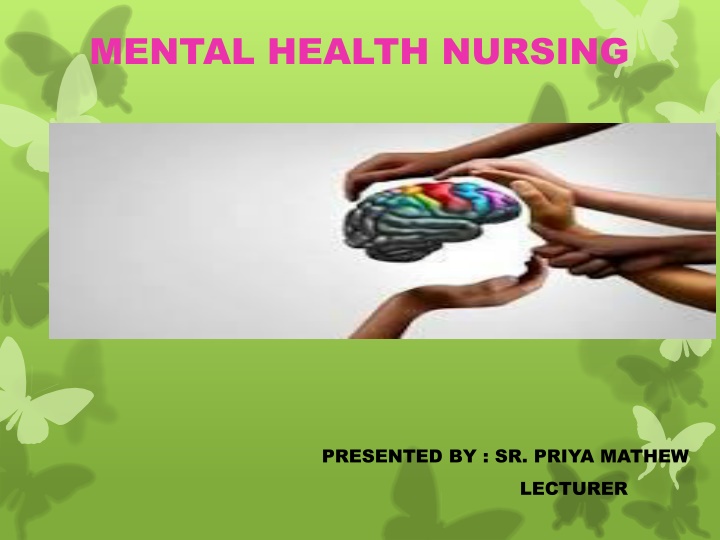
Mental Health Nursing Terminologies
Explore the definitions and explanations of key mental health nursing terms such as mental health, mental illness, apathy, aphasia, anhedonia, and more. Dive into the world of mental health with Sr. Priya Mathew, a lecturer in the field, to grasp the nuances of these important concepts.
Download Presentation

Please find below an Image/Link to download the presentation.
The content on the website is provided AS IS for your information and personal use only. It may not be sold, licensed, or shared on other websites without obtaining consent from the author. If you encounter any issues during the download, it is possible that the publisher has removed the file from their server.
You are allowed to download the files provided on this website for personal or commercial use, subject to the condition that they are used lawfully. All files are the property of their respective owners.
The content on the website is provided AS IS for your information and personal use only. It may not be sold, licensed, or shared on other websites without obtaining consent from the author.
E N D
Presentation Transcript
MENTAL HEALTH NURSING PRESENTED BY : SR. PRIYA MATHEW LECTURER
SPECIFIC OBJECTIVES Define Mental Health Define Mental Health Nursing Explain the Mental Health Terminologies
MENTAL HEALTH Mental health is the successful adaptation to stressors from the internal or external environment
MENTAL ILLNESS Mental illness is the mal adaptive responses to stressors from the internal or external environment, evidenced by thoughts, feelings, and behaviors that are incongruent with the local and cultural norms, and interfere with the individuals social, occupational and physical functioning
APATHY Lack of emotional feeling
APHASIA Absence or impairment of the ability to communicate through speech, writing, or signs, due to dysfunction of brain centers
ANHEDONIA Inability to experience pleasure in any activity
AUTISTIC THINKING occupations person from reality Pre totally removing a
CIRCUMSTANTIALITY A pattern of communication that is demonstrated by the speaker s inclusion of many irrelevant and un necessary details in his speech before he is able to come to he point
TANGENTIALITY A form of thinking/ speech in which the client tends to wander away from the intended point, and never returning to the original ideas
DELUSION A false, unshakable belief, which is not amenable to reasoning and is not in keeping with the patients socio- cultural and educational back ground
DELUSION OF PERSECUTION In a persecutory delusions, individuals believe that they are being malevolently treated in some way.
DELUSION OF REFERENCE The individual may falsely believe that others are talking about him
DELUSION OF JEALOUSY The content of jealous delusions centers around the theme that the person s sexual partner is unfaithful.
DELUSION OF GRANDIOSITY Individuals with grandiose delusions have irrational ideas regarding their own worth, talent, knowledge or power
ILLUSION The misinterpretation of a real, external sensory experience. It is mental misperception of actual sensory stimuli
HALLUCINATION A false sensory perception in the absence of an actual external stimulus.
DEPERSONALIZATION A person s subjective sense of being unreal, strange or unfamiliar
DEREALIZATION A subjective sense that the environment is strange or un real, a feeling of changed reality
DEMENTIA A global impairment of cognitive functioning that is progressive and interferes with social occupational abilities
DELIRIUM State of mental confusion and excitement that happens in a short period of time and is characterized by disorientation for time and place, usually, with illusions and hallucinations.
ECHOLALIA Pathological repetition of the speech of another
ECHOPRAXIA Pathological repetition by imitation of the behavior of another
LOOSENING OF ASSOCIATION A pattern of spontaneous speech in which things said lack a meaningful relationship, or there is idiosyncratic shifting from one frame of reference to another
MOOD Emotion that is prolonged to the point that it colors a person s entire psychological thinking.
AFFECT A short lived emotional response to an idea or an event
THOUGHT INSERTION The delusional belief that thoughts are being put in to one s mind
THOUGHT WITHDRAWAL The delusional belief that thoughts are taken away by some external agent, often associated with thought block.
THOUGHT BROADCAST The delusional belief that one s thoughts are being broadcast or projected in to the environment
